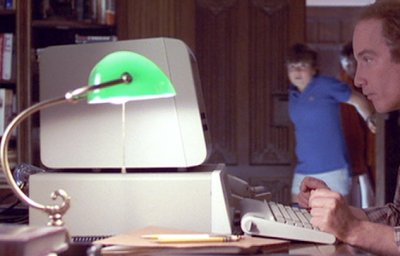Ah, publishing in the digital age! So many possibilities! So many complications!
The notion of “digital rights” for a book, believe it or not, has been around for about 20 years, even in the very early days of the personal computer (My family got our first computer in 1997, I think, possibility a little later than some; we enjoy staying fashionably behind the curve). I keeping thinking of the brilliant word processor Richard Dreyfus used in Stand By Me—a bulky beige contraption with a small black screen and blocky green text.


Yes, even in 1986 (when Stand By Me was produced) the digital age was taking hold. Publishing companies began including the “right to publish in unspecified digital formats” in their contracts with authors (you can read an overview of publishing contracts and rights here), though the first eReader (Sony’s, I believe) did not come out until around 2006.
Seeing “digital” as the great unknown looming in the [not so far off] distance, some publishers had the prescience to claim rights to something they did not even have concrete knowledge of—the ways of the future. Those who did were smart. The rest have ended up crawling through their fortresses of paper contract copies hoping they did the same, in whatever vague terms. And if they didn’t, they have to contact the author and ask if she/he would be willing to amend the contract to include digital rights. And then, once more, they must hope.
A publisher does not automatically have the right to publish a book in eBook format. They may have the print rights, but the two formats are negotiated separately. Publishers who did not have the forethought to include digital rights in an initial contract may face competition from other publishing houses later on for said rights. For instance, say a publisher puts out book that sells 50,000 copies, but neglected to include digital rights in the contract, when this fact comes to light, other companies would certainly jump on the opportunity to turn a profit by claiming a share of the glory through the eBook.
Alternatively, an author can withhold eBook rights on their book if it was not included in the initial contract. And this is essentially what J.K. Rowling did. Bloomsbury Publishing in the UK, it would seem, neglected digital rights for the Harry Potter series. How could they have known HP would become a cultural phenomenon? And that in a just a few years reading books on tiny portably screens would be the new norm?
Rowling opened the beta version of her mysterious website, Pottermore, last year (scheduled to open to the public in Aril this year). Now, Rowling has created the imprint Pottermore Publishing and is selling her eBooks of the entire HP series exclusively on her Pottermore website. Talk about missed opportunities, Bloomsbury. Barnes & Noble and Amazon want in on the action, but they best they can do is link to her website for the sell.
Life lessons. Plan wisely for the digital future, even if you don’t really know what that is. Or J.K. Rowling will take over the world.